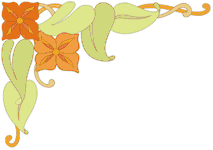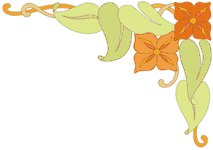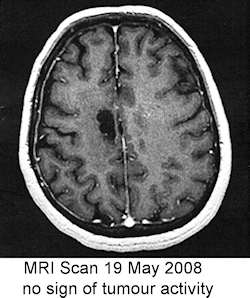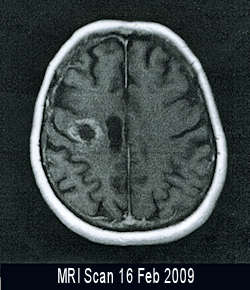 |
 |
 |
| Life | Walks | Patient | Carers | Wedding | Art | Ireland | Death | Home |
|
Patient vision As part of a fledgling art project, and as long as she was able, Kathy took photos of her everyday life as she underwent treatment both for rheumatoid arthritis and a brain tumour with a terminal prognosis. In some cases, Mel took the pictures for her. The record was never as full as she would have wanted - but here is a collection of some of the photos in the form of a slideshow. She remained optimistic for most of time - hence the choice of music.. Timeline Drawn from Mel and Kath's diaries, here is the sequence of major events in Kathy's two and a half year cancer journey. February/March 2007 - During a walk on the beach Kath notices slight oddness in walking - something almost imperceptibly unusual about the movement of her left leg. April 2007 - Balance problem and dragging leg. Doctors initially think problems are associated with drugs being used to treat rheumatoid arthritis. MRI scan reveals tumour. Kath becomes unable to walk.
9 May 2007 - 3.5 hour operation at Wessex Neuro Centre, Southampton, to debaulk tumour. This is carried out with Kath fully conscious. 10 May 2007 - Discharged and returns home. 12 May 2007 - Kath distressed to find she can no longer type out emails - the words come out in a jumble. 15 May 2007 - Got definitive diagnosis of grade 4 glioblastoma multiforme. Just about the worst news it could be. Immediate prospect for Kath is 6 weeks of daily radiotherapy and chemotherapy. After that it will at some stage start to grow again 21 May 2007 - First visit from Jane, the MacMillan sister who is to be our constant support throughout the two and a half year cancer journey. Kath suffers terrors mostly at night during this period. We are reminded of Munch's painting "The Scream". 31 May 2007 - A Macmillan unit psychologist begins visits to help Kath deal with her fears. 3 June 2007 - We drive to London to see an exhibition at the Hayward Gallery 11 June 2007 - Six weeks of radiotherapy and temozolamide chemotherapy start - at this stage Kath is walking round again and reasonably well. She can also write. 18 June 2007 - The main differences from how she was before the tumour appeared are that she is now quite "slow" in reacting to things and has to concentrate on doing one thing at a time. She also finds it difficult to cope in situations where several voices are speaking. She is putting on weight because of the steroids and also has some terrible times (usually at night) when all the anguish, fear etc comes out. 5 July 2007 - The chemotherapy has resulted in some hair loss and Kath goes for a wig fitting. She hates the wig and tends to wear a hat instead. 28 July 2007 - As a temporary side effect of the treatment, Kath's condition seems to have deteriorated since the end of the radio/chemo therapy a week ago. Seems like the old symptoms are returning - she can hardly walk now, and additionally has no energy. That plus the loss of her hair and weight increase because of the steroids is making her very depressed. 23 August 2007 - Kath now walking again with great gusto. We climb to the top of Hengistbury Head - a local beauty spot. From now on we take a walk by the sea or around town virtually every day. There are occasional falls, but nothing serious. The time is punctuated by MRI scans, blood tests and visits to the consultant. Macmillan home support includes aromatherapy and help from the physiotherapist who provides equipment enabling Kathy to use the bath, toilet, shower etc with safety.. November 2007 - Kath gets a short booster course of Temozolamide. Christmas 2007 - Have a wonderful family Christmas. It marks the real beginning of our "bonus year" of remission which is marked by small outings, almost daily walks along the Bournemouth sea front and a couple of major events.
May 2008 - A dream realised for us both - a week's holiday in Italy in a hotel overlooking the Bay of Naples and Mount Vesuvius. Amazingly Kath manages to walk all round Pompeii on a very hot day - and even survives being hurled around in a bus piloted down twisty roads by a crazy Italian driver. August 8 2008 - After twenty years together we finally get married. Just close family and a couple of friends present. The date 08.08.08 is chosen because it was supposed to be lucky. August 21 2008 - We hold our wedding reception at the Miramar Hotel where we often used to stop and have afternoon coffee.. It is on a different day to the wedding to try and reduce the stress. October 2008 - Kathy resumes her art degree course. But has to abandon it again after a couple of months. December 2008 - A scan reveals the tumour has come back and is affecting her left side - including her face. Her left leg is failing her occasionally, causing her to fall. Now seems to have lost much of the use of her left arm and her speech has become slightly slurred. December 19 2008 - Short course of PCV chemotherapy starts. It does not seem to work. Kath's balance is now poor. Christmas 2008 - In spite of everything we have another wonderful Family Christmas. It is to be Kathy's last. She is getting weaker and finds the stairs increasingly difficult to climb. January 30th 2009 - A second course of PCV chemotherapy. We are still doing our seaside walks, but not as frequently as before.
February 10 2009 - Kathy's legs collapse under her during our walk by the sea. This is the last of the seaside walks. Within a few days Kathy is being pushed around in a wheelchair. February 14 2009 - We have a meal at a local restaurant, but Valentine's Day is a bitter sweet occasion. February 25 2009 - We are now sleeping downstairs. A hospital bed has been set up in the back of the living room overlooking the garden. Kath has very disturbed nights and has fallen over a number of times. We get a special device to help get her up off the floor. To help Mel cope at night, superb Marie Curie nurses take over the "night duty" from 10PM until 7AM. March 1 2009 - Go to Billy Ocean concert. Major problems with the disabled toilet which like many, is too small and poorly designed. March 3 2009 - A commode is delivered. March 13 2009 - Kath has fallen a number of times and also had a couple of fits. The consultant tries a final option - another short course of Temozolamide. March 17 2009 - Kath is now resting a lot. Today she woke and said she thought she was in a nest of fairies. Said she had heard their little voices and felt their little hands on her. She gets a bit confused about things and sometimes very distraught and sad, but is remarkably cheerful for a lot of the time. May 2009 - She is now completely unable to walk and attends a Macmillan Unit day centre once a week to do a spot of painting. Swelling of leg and foot reveals that Kath has developed Deep Vein Thrombosis in her left leg. Mel has to give her an injection in her tummy every night, but this is ceased after a week because it conflicts with another drug being used to control rheumatoid arthritis. A member of the local Catholic Church comes once a week to give Kath Holy Communion. She is starting to confuse memories, wishes and things she sees on TV with her own reality. May 7 2009 - Consultant tells us that the tumour is continuing to grow and there is no further treatment available. Prognosis weeks or months. Can't be sure. May 15 2009 - Members of the Palliative Care Team manage to arrange for Kathy to have a proper bath at a local health centre. This is something she has really wanted. They are super people. May 27 2009 - Kathy has a serious fit during the night. This marks a major deterioration. She is now permanently bed-bound. Her speech and thought have become very confused for much of the time. From now on she sleeps a lot. Now entering the final stages of the disease she is, although often confused, very sweet natured, sometimes humorous and frequently thinking of others. June 19 2009 - Kath had intended to write letters to people and it appeared that the chance had passed by until tonight when she dictated eight letters, via the Marie Curie nurse, to family and close friends. Don't know how she summoned up the will and energy to do it. July 2009 - By now Kathy is unable to open her eyes any more although she can occasionally speak. Mel gives her flowers for her birthday - but she can't see them. She is having great difficulty with tablets. Seems unable to work out how to chew or swallow them. It is decided to inject drugs automatically via a syringe driver which district nurses will top up and maintain every morning. For the first time in two and a half years Mel is no longer administering drugs other than Dexamethasone steroid which is given orally by syringe. On hand, as ever for emergencies, are Oramorph for pain and Lorazepam for agitation or fits. July 6 2009 - Mel gave Kath her breakfast of toast and lemon curd. She ate it and he told her she had done well. She replied, "You've done well" . He said, "We've both done well - in everything." She said, "We don't give up do we." And he agreed. Kath's utterances are often confused and incomprehensible. This was a moment of clarity - and a lovely one. August 2009 - Kathy is now asleep virtually all of the time. She has however managed a few words - most movingly on 13 August with some special words for Mel. As she wished, she had "made" their wedding anniversary. 18 August 2009 - Kathy ate her last meal. From now on she was unable to eat. Mel is advised not to offer food or drink unless she asks for it. Because of her consciousness level she could choke. 19 August 2009 - Fears that Kathy will die during the day. Catholic Priest comes round to anoint her and administer "Last rites". 21 August 2009 - Kathy officially goes onto the "LCP" Care of the Dying pathway. For the next few days she is peacefully unconscious. 28 August 2009 - Kath has developed pneumonia overnight and her breathing is laboured. Several times, as Mel had promised her, he anointed her forehead with holy water, placed a crucifix in her hand and said a special prayer. Shortly after midday her breathing suddenly became easier and she passed peacefully away. Gathered around her were her family and two of her closest friends. It is the way she would have wished it. Key Facts
If you would like to facilitate much needed research into brain tumours and help support those affected by them, please make a donation to Brain Tumour UK.
|
 3
May 2007 - Surgeon says he can operate - but treatment will only
be palliative. If nothing is done, Kath will be dead within two months.
The tumour is about 3cm round and right in the middle of her head.
3
May 2007 - Surgeon says he can operate - but treatment will only
be palliative. If nothing is done, Kath will be dead within two months.
The tumour is about 3cm round and right in the middle of her head. March
2008 - Visit to the Eden Project in Cornwall. This is our first
night away from home together for more than a year.
March
2008 - Visit to the Eden Project in Cornwall. This is our first
night away from home together for more than a year. January
31 2009 - Go to see Verdi's opera Aida.
January
31 2009 - Go to see Verdi's opera Aida.